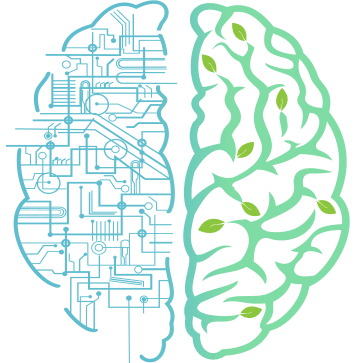Healthy guts and productive days
A productive day means being clear about what you want to accomplish, using all of your personal resources to achieve those goals efficiently and effectively. It would require the energy and the mental resilience to be persistent and stay aligned with your vision. Motivation is a key factor in working towards our goals. We need to have something that is pulling us towards achieving the success we want in life. However there are days when we have trouble focusing, feel overwhelmed, easily distracted, and are unable to find the motivation or will power to get things done.
The gut can significantly influence someone’s mood and mental state. What you eat during the day can have a positive or negative impact on your performance, productivity, and well-being. We are impacted by the conditions of our gut on every level, from our mood to how we adapt to the environment, to our ability to resist disease.
What isthe gut microbiome ?
The gut microbiome includes everything from your mouth to your colon, from where it enters to where it leaves. There are trillions of bacteria, fungi, viruses, and cells that live in the stomach, small intestine, and large intestine. In the gastrointestinal tract, all the bacteria, commensal, and pathogenic, live together to mediate intestinal homeostasis.
The importance of gut health
if you don’t have a healthy gut it can cause autoimmune conditions such as diabetes, neurodegenerative disorders like Alzheimer’s and even emotional issues like anxiety and depression. When you eat poorly, you can suffer from two negative outcomes: one is that you will not get the nutrients you need to stay healthy. The other can alter the composition of your gut microbial, making it impossible to properly breakdown nutrients
Dietary intake provides three molecules
- Tryptophan is an amino acid needed to build proteins, muscles, enzymes, and neurotransmitters in the body. Because it cannot be produced by the body, you have to consume it through your diet. Turkey, eggs, and chia seeds, which cause sleepiness after eating or the feeling of “food coma”, contain tryptophan. Tryptophan is converted by the body into many important molecules. Like the happy chemical serotonin as well as melatonin, which helps you sleep.
- Tyrosine is a non-essential amino acid. It regulates the functions of hormone-producing organs such as the adrenal, thyroid, and pituitary glands. Tyrosine helps form almost every one of the body’s proteins. It can be converted into dopamine, which can motivate you to perform tasks and foster initiative behavior. It can also be converted into epinephrine, which is responsible for the fight or flight response in humans. Tyrosine has been demonstrated to increase cognitive ability in young adults, even in stressful situations. A number of foods contain tyrosine, including almonds, lentils, and seeds.
- Indole-3-propionic acid (IPA) is a precursor to ILA (indole 3 lactic acid) so when ILA levels are low it will impact IPA levels. In the event these metabolites are out of balance, it can result in imbalance or gut dysbiosis. ILA is important for gut health since it actually transforms into IPA. One of the strongest antioxidants in the body is indole-3-propionic acid which minimize bodily inflammation, improve memory, and enhance mood. Consuming fiber-rich foods and fermented foods increases indolepropionic acid concentrations.Fermented foods like miso, kimchi, sauerkraut, yogurt, pickles, and kefir, as well as fiber-rich fruits and vegetables, may be beneficial for improving gut health by increasing the diversity of our gut microbiomes.
“. . . our body is an ecosystem. This ecosystem must be maintained . . .”
― Ilchi Lee, Belly Button Healing: Unlocking Your Second Brain for a Healthy Life
According to Research
The gut is thought to be a “second brain,” as what goes on in the gut can send messages to the brain that help you think positively or negatively throughout the day. Digestion involves a great deal of mental strain. Several different processes are needed to break down food, absorb nutrients, and expel waste, such as chemical processing, mechanical mixing, and rhythmic muscle contractions.
As just one example, the sensation of butterflies in the stomach is part of our physiological stress responseWhile gastrointestinal (GI) distress can make us feel crappy, our everyday emotional well-being may be determined by messages from the brain in our gut to the brain on our shoulders.
Emotions have a way of affecting your whole being and can reduce your productivity.Our bodies convert nearly everything we eat into glucose, which is the energy we need to stay alert. When we’re running low on glucose, we have a tough time staying focused and our attention drifts. Our bodies process different kinds of foods differently. The glucose in food, such as pasta, bread, cereal, and soda, is released rapidly, resulting in a burst of energy followed by a slump. Alternatively, high fat meals (such as cheeseburgers) sustain energy longer, but strain our digestive system and reduce oxygen levels in the brain. These factors take effect on how productive you’re inspired to be throughout the day. Additionally, researchers found that depression, anxiety, and behavioral procrastination are positively correlated. No matter how determined you are, getting things done while depressed is tough.
For more impressively productive days, here are some tips for taking care of your gut.
Add to or adjust your diet. consuming a variety of foods
Low glycemic index foods tend to improve concentration, memory, and functioning capacity, whereas those foods rich in simple sugars seem to result in difficulty focusing and paying attention. Polyunsaturated fatty acids have been shown to prevent cognitive decline associated with excessive saturated fat consumption.
Some low glycemic index foods can be:
- Salmon
- Almonds
- Wild rice
- Wheat pasta
- Oatmeal
- Summer squash,
- Zucchini
- Navy beans
- Chick peas
- And plenty of fruits
Some good sources of polyunsaturated fatty acids can come from:
- Pine nuts
- Walnuts
- Flax and sunflower seeds
- Also plant-based oils contain a high percentage of polyunsaturated fatty acids beneficial at room temperature.
“Food that we eat is the very substance that causes the whole hormonal structure of the body to go haywire because it’s on acid-base. So you’re going to get acid thoughts.”
– Dr. Sebi
To keep you from feeling overwhelmed – strawberries, oatmeal, cherries, avocado, raw almonds, tempeh, lentils, spinach, raw vegetables, chamomile tea Can help you keep your cool. Try to prevent feeling Stressed out byEating less salt, processed meat, sugar, caffeine, and fried foods.
To maintain motivation – oatmeal and Dark green leafy vegetables are packed with folate. All foods or supplements containing B vitamins found in foods like whole grain, citrus fruit, and avocados, are part of a group of eight essential dietary micronutrients that work in synergy on a cellular level and are crucial for brain health. The vitamins B1, B6, B12, B9 (folic acid) and D, choline, iron and iodine contribute to the improvement of mental performance. This vitamin increases blood flow to the brain, which is sometimes used to alleviate bipolar depression.
- –Pecans pack a mighty punch because of their choline levels. Choline can enhance muscle performance during exercise and improve stamina through its activity at a cellular level. Other good sources of Choline can be found in cruciferous vegetables like broccoli and cauliflower, salmon, and shiitake mushrooms
- The manganese present in Kale increases concentration, mental performance, and alertness.
- A cup of Green tea also keeps your mind sharp, boosts your memory, helps you fight mental fatigue, and improve your focus.
- Sunflower seeds contain tryptophan, an amino acid processed in the brain into serotonin, which is involved in feelings of happiness and contentment
- Serotonin levels are also boosted by Walnuts due to omega-3 fatty acids. Walnuts contain a significant concentration of DHA, a type of Omega-3 fatty acid; DHA has been shown to prevent or reverse age-related cognitive decline, among other benefits. According to this study, walnuts are prebiotics because they increase the number and activity of several enzymes including lactobacillus, a typical probiotic. Prebiotic dietary substances boost the number and activity of beneficial bacteria in your gut
Even the skin of eggplants contains a nutrient called nasunin, which enhances communication between brain cells, keeping you sharp and on point.
Afterthought
In several studies, it was demonstrated that the nutritional content of the Mediterranean diet and its associated vitamins and minerals lead to improvements in the gut microbiome. Simply eating more variety of fruits and vegetables, salads for starters and side dishes, snacking on fruits, adding vegetables to other dishes, and switching out red meat with fish at least twice a week will help improve your gut, the second brain that is important to your mood for more impressively productive days.
J.G Holland once said, “The mind grows by what it feeds on,”
You can easily crush your goals, and science supports this idea: If you consume garbage, then you will project garbage








